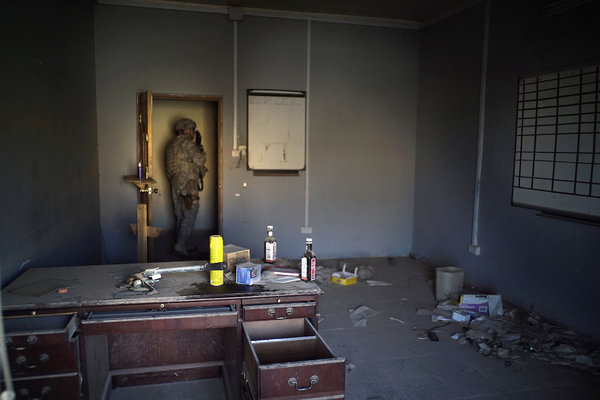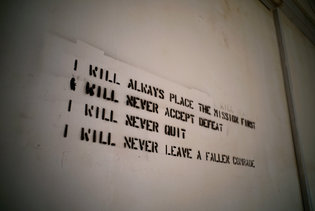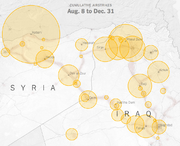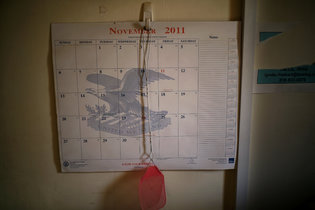U.S. Forces, Returning to Iraq, Encounter the Things Their Comrades Carried
By TIM ARANGOJAN. 6, 2015
Photo

Remnants of the previous United States military presence in Iraq, mostly untouched, have greeted troops now that American forces are returning to the country. Credit Ayman Oghanna for The New York Times
CAMP TAJI, Iraq — The calendar on the wall reads November 2011.
On the ground is a half-filled can of Copenhagen smokeless tobacco. Scattered here and there are bottles of Gatorade, cans of Rip It energy drinks, poker chips, Monopoly money and razor blades.
Stenciled on a wall is a punchy soldier’s slogan: “I will always place the mission first. I will never accept defeat.” Taped on another is a note of encouragement from a Boy Scout troop back home: “You are our hero and your commitment to freedom is honorable.”
There is even a jar of salsa still in the fridge.
When the American troops left Iraq three years ago, they left behind a fragile country that collapsed into civil war. They also left behind the detritus of soldiers’ lives that, in the ensuing years, was left untouched, frozen in time.
Now that American forces, in much smaller numbers, are returning to help the Iraqis confront the extremists of the Islamic State, they have found themselves reoccupying some of their old places. And they are excavating what feels like a slowly decaying time capsule as they discover the things they left behind.
Photo

A soldier's slogan stenciled on a wall. Credit Ayman Oghanna for The New York Times
When the Americans left, they turned over their bases to the Iraqis. But here at Taji, aside from some buildings that were clearly ransacked and probably looted of anything valuable, many of the spaces, now covered in a thick coat of dust, were left alone.
One soldier said he found pinups from Maxim, a men’s magazine, still on the walls. And the last copies of Stars and Stripes, the armed forces newspaper, delivered just before the American departure, are still scattered about the floor of one of the bathrooms. The score from an NFL playoff game in 2011, now considered a classic upset, is painted across an awning: Saints 36, Seahawks 41.
At Taji, about 20 miles north of Baghdad and once home to a sprawling American air base, even the street signs the Americans posted are still up. Separating a patch of housing units from the cavernous aircraft hangars is the corner of Longhorn Avenue and 46th Street.
Continue reading the main story

Laith al-Khadi works on the base at a convenience store stocked with the necessities of a soldier’s life: energy drinks, Cuban cigars, DVDs and many other things. He is happy to see the Americans back and, to accommodate them, is trying to find a stock of Copenhagen. “It’s good for us,” he said. “Sales are booming.”
So far, the Americans have taken up residence at two of their old hubs, here and at Al Asad Air Base in Anbar Province. The Army is here, and the Marines are in Anbar. It is a tiny footprint compared with the past — about 180 soldiers here, and an additional 200 or so military personnel in Anbar.
For weeks, before starting their training programs with new Iraqi recruits, Marines and soldiers have had to refurbish their areas of the bases, filling sandbags, fortifying perimeters and getting the electricity working.
Photo

A military calendar dating back to November 2011, when American forces left Camp Taji base. Credit Ayman Oghanna for The New York Times
One Marine major in Anbar, who has been in Iraq before and had just returned from Afghanistan in September when he was ordered back to Iraq, said it was “eerie” and “spooky” to return. Another said the place looked like “a train wreck.”
First Lt. Nolan Gore, a Marine from Texas who has been busy setting up the camp in Anbar, said that when he arrived, the place looked “apocalyptic.” Then he thought about it and said it actually looked “post-apocalyptic.”
When the Marines are attacked by rockets or mortar rounds — as they are frequently, but so far with no casualties — they can often pinpoint the source of the fire, send the information up the chain and then watch on a screen in their headquarters as the attackers are taken out by airstrikes.
Continue reading the main story

The Marine major, who spoke anonymously because he was worried that identifying him could put his family at risk of an attack by ISIS, said he had been trying to explain to the Iraqis, “We are not going to come in this country and clear it out again.”
Many, but not all, of the troops who have come back to Iraq have been here before, sometimes multiple times. The mission is different this time — not to fight, but to train units of Iraqis to do the fighting themselves.
Many of them feel that for the Iraqis to be most effective against the Islamic State, they should have American advisers accompany them closer to the front lines to at least help pinpoint targets for airstrikes. President Obama has so far resisted that step.
Photo

Piles of barriers around the doorways of what had been military housing. Credit Ayman Oghanna for The New York Times
On a tabletop at the headquarters building here at Taji is a copy of a recent issue of Foreign Affairs, its headline “What Have We Learned? Lessons From Afghanistan and Iraq.”
Inside, highlighted in green ink, are several passages.
“The United States also needs to cultivate better strategic thinkers in both the military and the civilian spheres” is one.
“Plan for what comes after the overthrow of a regime” is another. Still another: “Challenge rosy assumptions during the course of a conflict.”
Command Sgt. Maj. Robert Keith of the Army is here for his fifth deployment. Watching the news last year about the gains of the Islamic State, also known as ISIS or ISIL, across Iraq, he had a feeling he would wind up back here.
His family had mixed reactions to his deployment orders.
“I don’t think my wife was surprised,” he said. “She’s been with me awhile; she’s a strong woman.” His father had a different take, the sergeant major said. He responded abruptly with vulgarity.
http://www.nytimes.com/2015/01/07/world/middleeast/us-forces-returning-to-iraq-unearth-the-things-their-brethren-carried.html?_r=0
By TIM ARANGOJAN. 6, 2015
Photo

Remnants of the previous United States military presence in Iraq, mostly untouched, have greeted troops now that American forces are returning to the country. Credit Ayman Oghanna for The New York Times
CAMP TAJI, Iraq — The calendar on the wall reads November 2011.
On the ground is a half-filled can of Copenhagen smokeless tobacco. Scattered here and there are bottles of Gatorade, cans of Rip It energy drinks, poker chips, Monopoly money and razor blades.
Stenciled on a wall is a punchy soldier’s slogan: “I will always place the mission first. I will never accept defeat.” Taped on another is a note of encouragement from a Boy Scout troop back home: “You are our hero and your commitment to freedom is honorable.”
There is even a jar of salsa still in the fridge.
When the American troops left Iraq three years ago, they left behind a fragile country that collapsed into civil war. They also left behind the detritus of soldiers’ lives that, in the ensuing years, was left untouched, frozen in time.
Now that American forces, in much smaller numbers, are returning to help the Iraqis confront the extremists of the Islamic State, they have found themselves reoccupying some of their old places. And they are excavating what feels like a slowly decaying time capsule as they discover the things they left behind.
Photo

A soldier's slogan stenciled on a wall. Credit Ayman Oghanna for The New York Times
When the Americans left, they turned over their bases to the Iraqis. But here at Taji, aside from some buildings that were clearly ransacked and probably looted of anything valuable, many of the spaces, now covered in a thick coat of dust, were left alone.
One soldier said he found pinups from Maxim, a men’s magazine, still on the walls. And the last copies of Stars and Stripes, the armed forces newspaper, delivered just before the American departure, are still scattered about the floor of one of the bathrooms. The score from an NFL playoff game in 2011, now considered a classic upset, is painted across an awning: Saints 36, Seahawks 41.
At Taji, about 20 miles north of Baghdad and once home to a sprawling American air base, even the street signs the Americans posted are still up. Separating a patch of housing units from the cavernous aircraft hangars is the corner of Longhorn Avenue and 46th Street.
Continue reading the main story

Interactive Graphic: How the Air Campaign Against ISIS Grew
Laith al-Khadi works on the base at a convenience store stocked with the necessities of a soldier’s life: energy drinks, Cuban cigars, DVDs and many other things. He is happy to see the Americans back and, to accommodate them, is trying to find a stock of Copenhagen. “It’s good for us,” he said. “Sales are booming.”
So far, the Americans have taken up residence at two of their old hubs, here and at Al Asad Air Base in Anbar Province. The Army is here, and the Marines are in Anbar. It is a tiny footprint compared with the past — about 180 soldiers here, and an additional 200 or so military personnel in Anbar.
For weeks, before starting their training programs with new Iraqi recruits, Marines and soldiers have had to refurbish their areas of the bases, filling sandbags, fortifying perimeters and getting the electricity working.
Photo

A military calendar dating back to November 2011, when American forces left Camp Taji base. Credit Ayman Oghanna for The New York Times
One Marine major in Anbar, who has been in Iraq before and had just returned from Afghanistan in September when he was ordered back to Iraq, said it was “eerie” and “spooky” to return. Another said the place looked like “a train wreck.”
First Lt. Nolan Gore, a Marine from Texas who has been busy setting up the camp in Anbar, said that when he arrived, the place looked “apocalyptic.” Then he thought about it and said it actually looked “post-apocalyptic.”
When the Marines are attacked by rockets or mortar rounds — as they are frequently, but so far with no casualties — they can often pinpoint the source of the fire, send the information up the chain and then watch on a screen in their headquarters as the attackers are taken out by airstrikes.
Continue reading the main story

Graphic: Areas Under ISIS Control
The Marine major, who spoke anonymously because he was worried that identifying him could put his family at risk of an attack by ISIS, said he had been trying to explain to the Iraqis, “We are not going to come in this country and clear it out again.”
Many, but not all, of the troops who have come back to Iraq have been here before, sometimes multiple times. The mission is different this time — not to fight, but to train units of Iraqis to do the fighting themselves.
Many of them feel that for the Iraqis to be most effective against the Islamic State, they should have American advisers accompany them closer to the front lines to at least help pinpoint targets for airstrikes. President Obama has so far resisted that step.
Photo

Piles of barriers around the doorways of what had been military housing. Credit Ayman Oghanna for The New York Times
On a tabletop at the headquarters building here at Taji is a copy of a recent issue of Foreign Affairs, its headline “What Have We Learned? Lessons From Afghanistan and Iraq.”
Inside, highlighted in green ink, are several passages.
“The United States also needs to cultivate better strategic thinkers in both the military and the civilian spheres” is one.
“Plan for what comes after the overthrow of a regime” is another. Still another: “Challenge rosy assumptions during the course of a conflict.”
Command Sgt. Maj. Robert Keith of the Army is here for his fifth deployment. Watching the news last year about the gains of the Islamic State, also known as ISIS or ISIL, across Iraq, he had a feeling he would wind up back here.
His family had mixed reactions to his deployment orders.
“I don’t think my wife was surprised,” he said. “She’s been with me awhile; she’s a strong woman.” His father had a different take, the sergeant major said. He responded abruptly with vulgarity.
http://www.nytimes.com/2015/01/07/world/middleeast/us-forces-returning-to-iraq-unearth-the-things-their-brethren-carried.html?_r=0








» For fear of being "upset"... MPs "evade" signing to host Al-Sudani in Parliament
» Al-Sudani’s statement to convert 40% of Iraq’s exports into derivatives.. What does it have to do wi
» An Iraqi-American partnership to benefit from oil field gas
» The Minister of Commerce announces the distribution of the first payments of farmers’ dues for the 2
» Sudanese to members of the Iraqi community in the American city of Houston: Iraq has regained its he
» Romanski announces loans worth $50 million to support the Iraqi private sector
» Prime Minister: We plan to invest production capacities for export
» Al-Sudani's visit to Washington.. Implications and results
» “Something happened” in Iran and no one is talking about Iraq and Syria. This is what we have so far
» Al-Sudani asks the American Baker Institute for assistance in preparing studies related to the oil m
» The Interior Ministry denies the occurrence of explosions inside Iraqi territory and diagnoses “the
» Tensions between Najaf and Baghdad over the airport... the rule of law over “military force” and the
» Al-Sudani from Washington: We agreed with Abu Dhabi on joint management of Al-Faw Port
» "Al-Party" talks about the region's elections and reveals the reason for refusing to pay salaries di
» Russia's oil is taking more of the Middle East's shares in the Indian market.. How much has Iraq los
» Early next month.. Traffic confirms that the electronic payment system is working only
» The Service Council accuses state departments of refraining from disbursing bonuses because of the m
» Electricity: The Baghdad street lighting campaign will be completed before the middle of this year
» Oil poses two conditions for moving the Doura refinery to an alternative location
» The Foreign Minister reveals the truth about his resignation and the reason for his departure to Erb
» Progress: Al-Halbousi’s acquittal has become conclusive, and his return to the presidency of Parliam
» Disagreements strike Al-Maliki's coalition over choosing the governor of Diyala
» The Union accuses Türkiye of exploiting the political situation for a ground incursion into Iraq
» The Democratic Party: Barzani is eagerly awaiting the results of Al-Sudani’s visit to Washington
» Frame: Al-Halbousi in the news and his return has become a pipe dream
» A parliamentary request to capitalize on Erdogan’s visit to Baghdad to end the water crisis
» utube 4/18/24 Iraq: Over 14 Agreements Signed Between Iraq and US BREAKING NEWS from Congress.
» utube MM&C 4/16/24 IQD Update - Iraq Dinar - America - Activate - Massive Economic Deals -
» Al-Sudani urges the US corporation Honeywell to help finish the Basra refinery
» Al-Sudani Meets with Representatives of Western Media Outlets in Washington
» Chairman of the Investment Authority signs the United Nations Convention on International Mediation
» PM: We will sign a contract to establish the Al-Faw refinery with a Chinese company
» PM arrives in Houston as part of his visit to USA
» Militia Man & Crew 4/18/24 Bush signed it and all presidents implemented it. Iraq’s funds have been
» Association of Iraqi Private Banks: The suspension of some electronic payment services yesterday was
» Iraq is close to launching the electronic signature
» The Basra government discusses with an international oil company the implementation of social benefi
» The Prime Minister confirms to an American company: Gas projects in Iraq are a priority for the gove
» The Minister of Planning discusses with the World Bank mechanisms for scheduling external loans
» Oil sets the twenty-seventh of this month as the date for opening contracts for the fifth complement
» “Electronic begging”...professionalism and fabrication of stories” generates millions of dinars dail
» Al-Sudani calls on the American company Hanwell to contribute to the completion of the Basra refiner
» An American company expresses its willingness to establish LED lighting production lines in Iraq
» Including Iraq.. Iran announces the possibility of exporting 300 megawatts of “renewable electricity
» Political forces present two options to find an alternative to Al-Halbousi
» Parliament is awaiting the arrival of the budget schedules and the government is studying higher spe
» The International Monetary Fund adjusts its expectations for the development of the world’s economie
» A representative talks about the difficulty of finalizing the file of “electing the Speaker of Parli
» Work on preparing a law for diplomatic passports
» A female representative accuses the Ministry of Immigration of corruption
» Minister: Solving the Kurdistan salaries problem is the beginning of addressing other disputes betwe
» About 270 million dollars were sold by the Central Bank of Iraq in the currency auction
» The volume of trade exchange between Jordan and Iraq will exceed 800 million dinars in 2023
» Iraq signs memorandums of understanding with American companies in the fields of electricity, oil an
» The American company that manufactures the F16 expresses its readiness to implement the terms of con
» The volume of expected Qatari investments for the Iraq Fund for Development exceeds $3.5 billion
» Decrease in dollar prices in Baghdad and Erbil
» The President of the Region brings together the Kurdish parties to resolve the election file
» Al-Sudani receives in Washington the Chairman of JPMorgan
» Transport is starting to transform its ports into smart ones
» Sudanese reveals the volume of exchange with America
» "Al-Eqtisad News" publishes the memorandums of understanding signed between the Iraqi delegation and
» Al-Sudani urges an American company to contribute to establishing a chemical materials factory
» Iraq stresses the importance of Lockheed Martin's commitment to opening military aircraft maintenanc
» Iraq is on the verge of a “water disaster” by 2035
» Great satisfaction and optimism with the results of Sudanese’s visit to Washington
» Transport is beginning to adopt a plan to transform its ports into smart ones
» Completed 8,000 loan transactions at the Housing Bank
» Prime Minister: We plan to invest production capacities for export
» Transformation and partnership...a new horizon in Iraqi-American relations
» What is new in the economic dimension of the Washington visit?
» Two letters to the future
» National interests first
» Iraqi-American rapprochement...a national necessity
» Al-Sudani’s visit to Washington and the course of Iraqi-American relations
» Sudanese carries security, economic and development files to Washington
» Armament and military development... features of a sustainable partnership
» Analysts: Sudanese's visit to Washington will achieve excellent results in the future
» Iraqi-American relations...the legacy of the past and the aspirations of partnership
» Sudanese and external necessities
» The Strategic Framework Agreement... 7 important provisions
» Joint statement of the Iraqi-American discussions
» Supreme Coordinating Committee: Iraq's role is vital to the security and prosperity of the region
» Towards an effective bilateral economic relationship between Baghdad and Washington
» She saw it as a new, different chapter in Iraqi-American relations... Al-Sudani’s visit to Washingto
» Al-Sudani’s visit to Washington.. Implications and results
» Advisor to the Prime Minister: The relationship with America has moved to the stage of cooperation
» Sudanese sponsors the signing ceremony of memorandums of understanding in America
» Al-Sudani: The volume of exchange between Iraq and the United States does not exceed 10 billion doll
» During Erdogan's visit on Monday, Iraq seeks to sign the "Water Protocol" with Türkiye
» With the escalation of tension between Tehran and Tel Aviv...an expert reveals the secrets of Sudane
» There are 150 draft laws on the parliament table waiting to be voted on... and the debates require c
» Al-Sudani stresses the necessity of continuing the dialogue with the US Treasury, the Federal Reserv
» Deputy: We reject the term sanctions, and Iraq is financially independent
» Warnings of a “political impasse” after Barzani’s boycott of the elections... Al-Sadr raises questio
» The head of the Kurdistan Regional Government’s representative office in Baghdad visits the external
» Al-Sudani: There are no combat forces in Iraq to withdraw.. The Iraqi Prime Minister confirmed in Wa
» Do the Iraqi political blocs really intend to hold the second early elections?